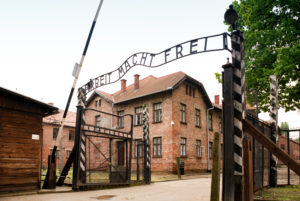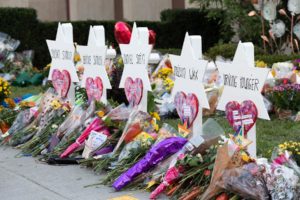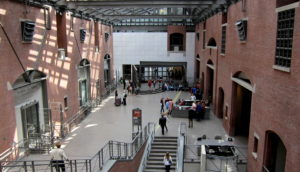Distortions of history, ignorance, denial top list of challenges as world marks 75th anniversary of Auschwitz liberation
Amid rising anti-Semitism, leading educators are searching for new ways to teach the public about one of the darkest chapters in human history.
Last week, Yad Vashem in Jerusalem, together with the president of Israel, hosted the World Holocaust Forum, attended by some 50 international leaders. It commemorated 75 years since the Red Army’s liberation of Auschwitz, the largest Nazi death camp.
January 27, the actual anniversary of the liberation, is International Holocaust Remembrance Day, and cities around the world are holding special events.
The primary commemoration is taking place in Oswiecim, Poland, at the Auschwitz Memorial, where some 200 Holocaust survivors from the United States, Poland, Canada, Israel, Australia and other parts of Europe will take part in an evening ceremony. Leaders from Germany, Israel and Switzerland, as well as dozens of delegations from international institutions, are also expected to attend.
“While the [survivors] can still tell us about their experiences, we need to listen,” Pawel Sawicki, a press officer and guide at the Auschwitz-Birkenau State Museum, told The Media Line. “Therefore, for the 75th anniversary, the survivors are the most important [and] honorable guests. They will be the main speakers that the world leaders will be listening to.”

The entrance to Auschwitz. (Wikimedia Commons/xiquinhosilva)
Over a million visitors tour the former Nazi camp each year. It is a place where more than 1.1 million people were killed, some 960,000 of them Jews. Overall, 6 million Jews perished in the Holocaust at the hands of Nazi Germany and its collaborators.
“This is a human story [about] suffering and the horrible experience of Auschwitz, but it’s also a human story when we think of the [perpetrators],” Sawicki said. “They were the same people as us today.”
Filling the Gap in Holocaust Education
While the Auschwitz commemoration will highlight the important role survivors continue to play, educators elsewhere are looking for new ways to teach people about the Holocaust.
In Pittsburgh, Pennsylvania, where painful memories of a violent hate crime are still fresh, that task has taken on an even more urgent significance.
On Saturday morning, October 27, 2018, a shooter entered the Tree of Life Synagogue in the Squirrel Hill neighborhood and opened fire, slaying 11 Shabbat worshipers and wounding six more. It was the deadliest anti-Semitic attack in the history of the United States.
“After the shooting at the Tree of Life, we constantly received questions from people about when Jews came to the United States, and there seemed to be this misconception that Jews came to the United States after World War II,” Dr. Lauren Bairnsfather, director of the Holocaust Center of Pittsburgh (HCP), related to The Media Line.
This holiday season, give to:
Truth and understanding
The Media Line's intrepid correspondents are in Israel, Gaza, Lebanon, Syria and Pakistan providing first-person reporting.
They all said they cover it.
We see it.
We report with just one agenda: the truth.


“I thought that that was dangerous,” she stated. “There needs to be more awareness of Jewish history.”
For International Holocaust Remembrance Day, the HCP will screen a documentary film about pogroms in eastern Europe, which are widely seen as a precursor to the Holocaust. Pogroms were organized, violent riots targeting Jews that first erupted in the Russian Empire in the 19th century.
The HCP is also planning to build a new Holocaust museum inside the Tree of Life building, which remains unoccupied since the attack. Details about this venture are set to be published in February.

A makeshift memorial is shown outside Pittsburgh’s Tree of Life Synagogue on October 30, 2018, three days after the fatal attack on worshippers, and the day President Donald Trump and first lady Melania Trump came to pay their respects. (Official White House photo/Andrea Hanks)
Bairnsfather emphasizes, however, that ignorance of history remains a major concern.
A Pew Research Center poll published last week revealed that fewer than half of American adults know the number of Jews who were killed in the Holocaust. Forty-five percent of those surveyed gave the correct answer, but 29% were uncertain or did not respond.
To counter this worrisome trend, the HCP, along with the nonprofit Together We Remember organization and the LIGHT Education Initiative, are launching an innovative program aimed at boosting Holocaust education in non-Jewish schools. As part of this venture, they are training a national network of student leaders and educators in addition to adding satellite Holocaust centers in local schools, each with its own materials and unique exhibits.
“It is such a challenge because we say that education is the answer, but that doesn’t mean you’re going to reach the audiences that you really need to reach,” Bairnsfather said.
“I don’t think we’re as effective as we could be when we go to a school one time or a school comes to the Holocaust Center on a field trip,” she added. “We want to embed these things in the schools so that they’re ongoing.”
Distortion and Denial
A growing issue facing many educators with regard to World War II is the rewriting of history. Tad Stahnke, William and Sheila Konar Director of International Outreach at the Washington-based US Holocaust Memorial Museum (USHMM), believes that the only solution is to promote quality education.
“One thing in particular we’re quite concerned about are efforts by important political figures in some of the lands where the Holocaust happened to rewrite and distort some of that history, to try to walk back the responsibility that the international communities have already expressed,” Stahnke told The Media Line.
He pointed to France’s far-right National Front Party and its former leader, Jean-Marie Le Pen, who in a memoir defended the notorious Vichy Regime, which collaborated with the Nazis. Furthermore, Björn Höcke, a member of Germany’s far-right Alternative for Germany (AfD) party, recently criticized Berlin’s memorial to the Jews murdered by the Nazis, calling it a “monument of shame.”
On January 24, the USHMM held its annual International Holocaust Remembrance Day event in its Hall of Remembrance, with Washington’s diplomatic community in attendance. It also organized an exhibit at the United Nations headquarters in New York called “Some Were Neighbors: Collaboration & Complicity in the Holocaust,” which examines the role ordinary people played during the war.

An interior shot of the United States Holocaust Memorial Museum in Washington. (Wikimedia Commons/AgnostocPrechearsKid)
Stahnke notes that as their numbers dwindle, survivors are going to become increasingly important in Holocaust education. He adds that the USHMM wants to encourage people to consider “the fragility of democracy, the dangers of unchecked hate and the consequences of indifference,” as well as similar subjects.
“It’s going to fall on educational institutions like memorial sites and museums to carry on that memory by promoting education and really continuing to make the case about why someone in the 21st century should learn about the Holocaust,” he emphasized. “When we look back in history, it’s to see not only what happened, but also what failed to happen and how that might inform us into the future.”
The Auschwitz Killing Machine
Dr. Christine Beresniova, executive director of the South Carolina Council on the Holocaust, echoes Stahnke’s comments and says that more of an effort needs to be made to show how the Nazi killing machine developed and reached its fulfillment in places like Auschwitz.
“Auschwitz is such an important symbol about the way that the modern industrial era was put in service to killing an entire group of people,” Beresniova told The Media Line. “This is a system and it takes time to develop, and there’s power in being alert to the warning signs of these kinds of things.”
On January 28, the South Carolina Council on the Holocaust will commemorate the liberation of Auschwitz at the University of Columbia Alumni Center. Guest speakers and attendees will include the governor of South Carolina and several political dignitaries, as well as teachers from all over the state. Elisha Wiesel, the only child of famed Holocaust survivor Elie Wiesel, will also speak.
In Los Angeles, the Simon Wiesenthal Center, together with the Museum of Tolerance, is holding a ceremony on Monday featuring a screening of Claude Lanzmann’s 1985 documentary Shoah.
“On the 75th anniversary of the liberation of Auschwitz, along with bowing their heads in respect for six million dead, we hope the leaders from European countries beset with anti-Semitism will commit to take action to protect and respect living Jews,” Rabbi Marvin Hier, founder and dean of the Simon Wiesenthal Center, conveyed to The Media Line.
The New York-based Museum of Jewish Heritage – A Living Memorial to the Holocaust, is offering free admission on January 27 and holding a special concert featuring a performance by famed violinist Itzhak Perlman.
“The mission of the Museum of Jewish Heritage – A Living Memorial to the Holocaust is to educate people of all ages and backgrounds, with students being our most important audience,” Jack Kliger, president and CEO of the museum, said in a statement to The Media Line.
In the United Kingdom, the BBC is set to air a series of special programs on the Holocaust that will include investigations into Holocaust denial. In France, UNESCO held an event on January 22 at its Paris headquarters, focusing on the how to preserve monuments to the Second World War and how to educate future generations about its horrors.